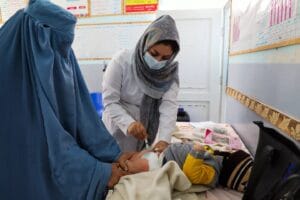Man tests positive for monkeypox, COVID-19, HIV at same time after 5-day trip to Spain

An Italian man tested positive for monkeypox, COVID-19 and HIV at the same time after a five-day trip to Spain – from June 16 to June 20 – according to a study.
Published in the Journal of Infection, the report said the 36-year-old man developed a fever, sore throat, fatigue and headache from the co-infection.

The patient reportedly first contracted COVID-19 in January and is immunized with two doses of the Pfizer vaccine.
However, he tested positive for the virus again after the trip and developed a rash on his arm, believed to be monkeypox, the same day.
The following day, “painful vesicles surrounded by an erythematous halo appeared on the torso, lower limbs, face, and glutes,” the study reported.
Two days later, after the spread worsened, the man admitted himself to a hospital in Italy where he was then transferred to the Infectious Disease Unit.
At the hospital, upon testing for sexually transmitted diseases, his result came back positive for HIV.
He reported during testing that he was treated for syphilis in 2019, while a voluntary HIV test in 2021 came back negative, the report said.
On July 11, nearly a week after admission, the patient was sent to isolate at home following resolved symptoms and the absence of new lesions, the study reported.
When he was tested for monkeypox, the results came back positive even after 20 days, “suggesting that these individuals may still be contagious for several days after clinical remission.”
The researchers said: “As this is the only reported case of monkeypox virus, SARS-CoV-2 and HIV co-infection, there is still not enough evidence supporting that this combination may aggravate patient’s condition. Given the current SARS-CoV-2 pandemic and the daily increase of monkeypox cases, healthcare systems must be aware of this eventuality…”
In a separate case, an Italian tourist with monkeypox, the first reported case in Cuba, had died, the country’s Ministry of Health announced on Monday.
“This patient rapidly deteriorated to critical condition, having been unstable since August 18, dying on the afternoon of the 21st,” the ministry said in a statement.
The Italian had been staying in a rented house and visited several places in the western provinces of the country. On Wednesday, he felt “general symptoms” of malaise and went to a doctor on Thursday because they persisted.
He was rushed to a hospital after suffering a cardiac arrest from which he later recovered.
The man’s close contacts are so far asymptomatic and remain in isolation, the ministry said.
The US CDC said in a report that the monkeypox virus can linger on many common household objects, though it’s not yet clear if that can spread the infection.
Monkeypox primarily spreads through direct contact with lesions or respiratory secretions during close contact with someone who is sick.
More than 90 percent of monkeypox cases in the US were associated with recent male-to-male sexual contact, according to a different CDC study.
The virus can also spread through fluids or objects used by an infected person, but it’s not yet clear how much some surface contamination contributes to indirect transmission of the virus, according to the study.
Last week, the World Health Organization announced it is looking to rename monkeypox and has called for help from the public in coming up with a less stigmatizing designation for the fast-spreading disease.
The UN health agency has for weeks voiced concern about the name of the disease that emerged onto the global stage in May.
Experts warn the name can be stigmatizing to the primates it was named after, but who play little role in its spread, and to the African continent that the animals are often associated with.
Recently in Brazil, for instance, there have been reported cases of people attacking monkeys over disease fears.














